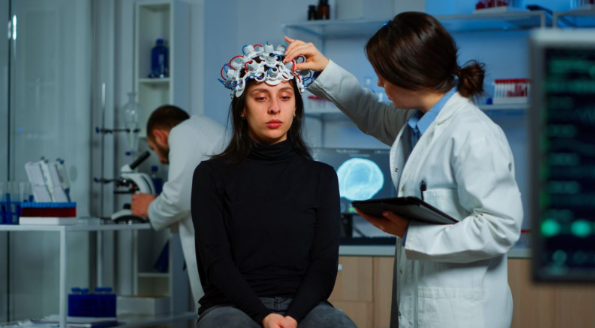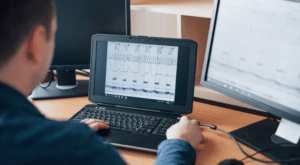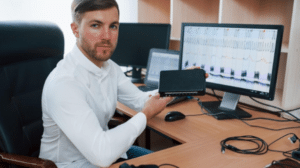The polygraph, more commonly known as a lie detector test, is one of the most controversial investigation techniques.
While proponents market the polygraph as a reliable tool for discerning deception, skepticism abounds about its true reliability. Some critics dismiss lie detector tests as a subjective technique employed by law enforcement officers to push their theories and get innocent suspects behind bars.
But despite the mixed opinion, one thing is undeniable – the polygraph has significantly revolutionized modern forensic science.
Here’s a look at how lie detector testing may facilitate forensic investigations, with a focus on forensic psychology.
Introducing Polygraphy

Polygraph testing utilizes special equipment to discern deception by measuring certain physiological reactions associated with lying. Those include respiration, perspiration, blood pressure, and heart rate.
The polygraph machine comes with different sensors, each designed to measure specific parameters. They include;
- Pneumographs – Measure respiration by tracking changes in thoracic pressure triggered by certain lie detector questions
- Cardiosphygmographs – Monitor blood pressure and heart rate in response to polygraph questions
- Galvanographs – Track perspiration, another physiological reaction associated with deception
Unknown to many, the lie detector test is a scientific investigation technique. The concept is premised on the belief that lying stimulates the autonomic nervous system (ANS), a nervous system division that regulates certain involuntary functions.
Increased perspiration, faster breathing rate, a racing heart, and elevated blood pressure are all signs of an aroused autonomic nervous system.
About Forensic Psychology
Forensic psychology evaluates the human mind within the broader context of the law. Experts in this field attempt to establish the correlation between a suspect’s behavior and the crime they’re accused of committing.
Forensic psychologists are one of the most significant parties in criminal or civil proceedings. While these professionals don’t pop up in every other trial, their opinions can help a judge or jury reach a proper verdict.

How Does Forensic Psychology Work?
Forensic psychology, or psychology in general, relies on nonverbal cues to reveal deception.
Typically, a professional starts by posing a question to the suspect. The queries must be unambiguous so that the respondent doesn’t have to think hard to answer them.
With each reply, the psychologist analyzes the suspect’s body language. Nervous fidgeting, breaking eye contact, excessive hand gestures, and defensive postures are carefully noted.
The expert also observes anomalous vocal cues. These include tonal variations and speech cadence.
A psychologist notes down facial expressions, too. Feelings of fear, anger, or disgust can paint a detailed picture of a person’s emotion processing.
Lastly, a forensic psychologist would take note of verbal inconsistencies. Critical things to watch out for here include making contradictory statements, giving vague replies, and over-explaining oneself.
Deceptive people also tend to project inappropriate emotions. They may laugh hysterically at an otherwise solemn question or experience emotional meltdowns while dealing with a casual topic.
Where Does Forensic Psychology And Polygraphs Intersect?
Lie detector tests focus primarily on physiological aspects of deception, while forensic psychology dwells on the psychological spectrum. However, the two are closely intertwined.
The amygdala is a region of the brain that helps with emotion processing. It’s notably responsible (alongside the insula) for controlling feelings of shame and guilt.
The amygdala also connects your emotions with other cognitive aspects, such as memory and learning. A disruption in its functioning can impact how we process emotions, causing physical anomalies synonymous with deception.
Studies have found a correlation between the amygdala and the autonomic nervous system.
While lying can elevate your heart rate by arousing the ANS, a racing heart may also spring from the psychological fear of getting punished for your crimes. The same is true for breathing pace, blood pressure, and skin conductivity.
Besides, lying exerts a greater load on the brain since it’s interpreted as a threat. To avert the threat, the brain signals your vital organs to go into overdrive.
Unfortunately, this happens at the detriment of other functions like speech. Forensic psychologists can then use anomalous speech patterns to infer deception.
But the relationship doesn’t stop there.
In jurisdictions where polygraph tests are admissible, polygraphers may need to cross-examine forensic psychologists. This ensures the professional didn’t lie in their psychological assessment of the suspect.

Other Similarities Between Polygraph Testing and Forensic Psychology
Both polygraph testing and forensic psychology follow the principle of clarity. Questions are asked in a direct and unambiguous manner, providing respondents with an opportunity to answer truthfully.
Besides, lie detector tests and forensic psychology rely on scientific techniques.
A change in heart rate or erratic facial expressions isn’t merely evaluated at face value. Instead, each projection undergoes extensive analysis to determine if it truly points to deception.
Moreover, both techniques are time-bound.
Lie detector tests typically last 1.5 – 2.5 hours, while psychological evaluations also take a few hours. Prolonging the sessions can overload the examinee’s brain, impacting their responses to the questions.

Wrap Up
Polygraph testing is yet to attain global recognition. However, the technique has played a critical role in driving forensic research and investigations over the years.
The widespread popularization of polygraphs has also influenced the development of more innovative deception detection technologies.
To improve the efficiency of lie detector tests, insist on having the exams conducted by a duly credentialed polygrapher.
Select an examiner who graduated from a reputable organization. Besides, the individual should preferably possess additional certifications in a forensic-related course.
More importantly, use polygraph findings alongside other forensic techniques to improve the outcome of any investigative process.






